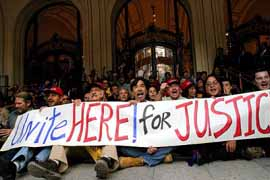After Two Years on the Line, San Francisco Hotel Workers Win Big Gains

After two years of strikes, lockouts, and intense negotiations, San Francisco hotel workers won a tentative agreement September 12 with substantial gains. The workers, represented by Local 2 of the Hotel, Restaurant, and Garment Workers union (UNITE HERE), ratified the agreement September 22.
“It’s a great contract,” said Aurolyn Rush, who has worked as a phone attendant at San Francisco’s Grand Hyatt for 10 years. “We hung on and we won.”
At a time when most unions are accepting serious health care and pension cutbacks, Local 2 resisted employer demands for a two-tier health care plan (under which new hires wouldn’t receive full coverage for their first five years on the job) and pension cuts. Instead, they won a 64 percent increase in health and welfare fund contributions, a 69 percent increase in pension contributions, and wage increases.
Rush, a Local 2 steward who was on the union’s negotiating committee, noted there were other key gains as well. “For me,” she said, “the biggest issue was raising the prescription drug cap. The cap used to be $2,000—anything going over that you had to pay out of your own pocket.”
Rush, who was diagnosed with breast cancer shortly after starting at the Hyatt, said that she used to go over the $2,000 cap every year. Under the new contract, the cap has been raised to $4,000.
Longtime Local 2 member Jon Palewicz, who also sat on the negotiating committee, said that the contract includes other important gains.
“We’ve had de facto discrimination against African Americans in our industry,” said Palewicz. “For some reason, fewer and fewer African Americans are working at the hotels—and we know it’s not because there are a lot of better jobs out there.”
According to Palewicz, the new contract includes a provision requiring the hotels to do “coordinated affirmative outreach” to the African American community.
Other key gains that Rush pointed to were workload reductions for room cleaners and improved health and safety standards for kitchen workers. “These are hard jobs,” said Rush. “People don’t realize how heavy these workloads are, the toll it takes on your body.”
LONG TIME COMING
Local 2’s struggle with San Francisco’s Multi-Employer Group (MEG), the business association representing 13 of the city’s major hotels, began in September 2004 when workers struck at four MEG hotels, demanding a fair contract. The MEG promptly locked workers out at all of its hotels.
The local immediately went on the offensive, picketing 24 hours a day, seven days a week, rallying political and community support, and calling a boycott of MEG hotels.
Said Palewicz, “Management’s saying the boycott cost them $50 million. I think it cost them more, but either way, it definitely had an impact.”

SUPPORT LABOR NOTES
BECOME A MONTHLY DONOR
Give $10 a month or more and get our "Fight the Boss, Build the Union" T-shirt.
After more than seven months, the MEG ended the lockout. The boycott, however, continued, and the MEG continued to feel the heat.
HOTEL WORKERS RISING
In Spring 2006, UNITE HERE launched its Hotel Workers Rising campaign, with hotels in cities across the U.S. and Canada running simultaneous contract campaigns.
“People were thinking beyond one contract—they were thinking about a movement across the country and the continent,” said Palewicz. “The major employers have hotels in most, if not all, of these cities…They had to be concerned about the threat of a nationwide action.”
Still without a contract, Local 2 members voted in August 2006 to authorize a strike and the union called for a day of picketing September 7 to “give management a taste” of what was to come.
Rush said that the strike vote and the September 7 action had a definite impact on management. “Right after the vote, they dropped a lot of [their demands].” Five days later, the union announced its tentative agreement.
BUILDING SUPPORT
Rush said Local 2 laid the groundwork for these gains with years of solid organizing, in the union and the community. “We had actions all the time,” she explained. “Speeches, rallies, civil disobedience. We got everyone involved. When there was a rally, it wasn’t hundreds of people showing up—it was thousands, every time.”
Rush continued, “We had a lot of support from clergy in the city, from politicians, the mayor. That keeps people’s spirits up.”
San Francisco’s hotel workers are a diverse group, representing a number of ethnic and immigrant communities. According to Rush, as the lockout wore on, management tried to isolate immigrant workers, particularly those who did not speak English, and “pull them away from the union.”
Rush said the union countered that by “making sure all of our members, no matter what language they speak, kept abreast of what’s going on. The union has people who speak different languages, who could make sure these people had the information they needed, and that they felt supported.”
To Local 2 President Mike Casey, while the financial gains are important, the provision guaranteeing UNITE HERE organizing access without employer opposition (neutrality agreements) at all hotels acquired or built by MEG companies in San Francisco and San Mateo counties is just as big.
“The right to organize is what this fight was all about,” explained Casey. “It’s part of a campaign to win card check neutrality for workers in several cities around North America. We actually won card check with Hilton and Starwood in several of these cities, but because we’re bargaining with the MEG, we got other companies as well.”
One of the other cities was Chicago, where UNITE HERE Local 1 announced a tentative agreement with Hilton September 7 and with Starwood September 14. Both include neutrality agreements for any newly built or acquired hotels. Settlements have also recently been reached in Monterey, California and New York City.





